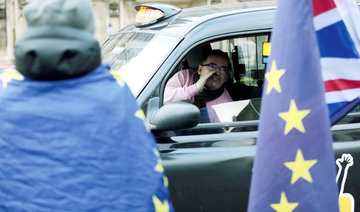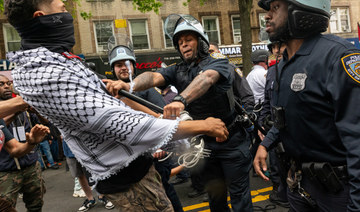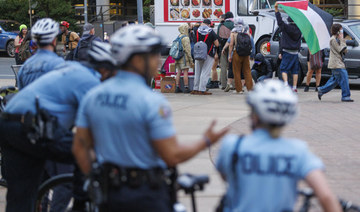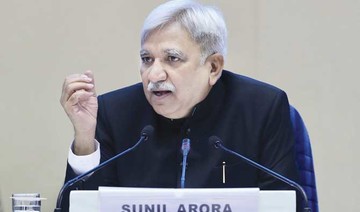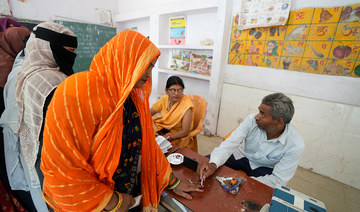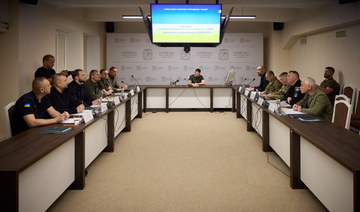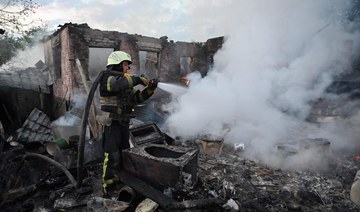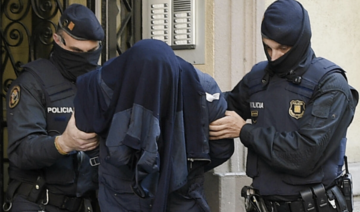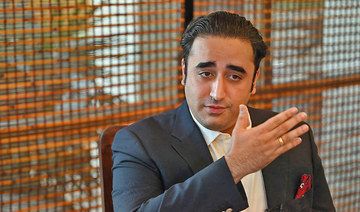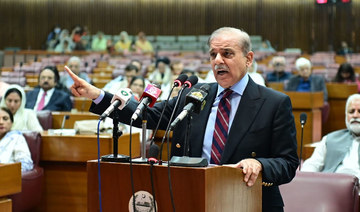LONDON: Prime Minister Theresa May said on Sunday she would not be derailed from leaving the EU, laying the groundwork for difficult meetings this week in which she will try to unite a divided cabinet behind her vision for post-Brexit Britain.
May was applauded by EU leaders in Brussels on Friday after securing an agreement to move previously-deadlocked talks forward onto the topic of interim and long-term trading arrangements.
The progress has gone some way to easing concerns of businesses and investors who fear Britain could crash out of the bloc without an exit deal, or that May’s fragile government could collapse under the pressure of delivering Brexit.
“Amid all the noise, we are getting on with the job,” May wrote in the Sunday Telegraph. “My message today is very clear: we will not be derailed from this fundamental duty to deliver the democratic will of the British people.”
But May can expect some difficult exchanges this week when she and senior ministers discuss the so-called “end state” of the Brexit negotiations for the first time since Britain voted to leave the EU in a referendum in June 2016.
The type of long-term relationship the country should have with the EU is a vexed question at every level in Britain, including within May’s cabinet where some want to keep close ties with the EU and others want a more radical divorce from Brussels.
Mindful of the need to keep both sides happy, May has so far plotted a careful path.
May says she wants a wide-ranging free trade deal with the EU and a more outward-looking trade policy, but has largely steered clear of the more contentious issues such as whether Britain should stay aligned with EU trading rules and the future role of European courts.
Meetings expected to take place on Monday and Tuesday are likely to force those issues out into the open.
One of the key pro-Brexit voices in the cabinet, foreign minister Boris Johnson, has set out his own view ahead of the meetings, warning May that Britain must avoid becoming subordinate to the EU.
“What we need to do is something new and ambitious, which allows zero tariffs and frictionless trade but still gives us that important freedom to decide our own regulatory framework, our own laws and do things in a distinctive way in the future,” he told the Sunday Times newspaper.
He said that mirroring EU laws would leave Britons asking “‘What is the point of what you have achieved?’ because we would have gone from a member state to a vassal state.”
Brexit will not be derailed, says UK’s May ahead of crunch cabinet meetings
Brexit will not be derailed, says UK’s May ahead of crunch cabinet meetings
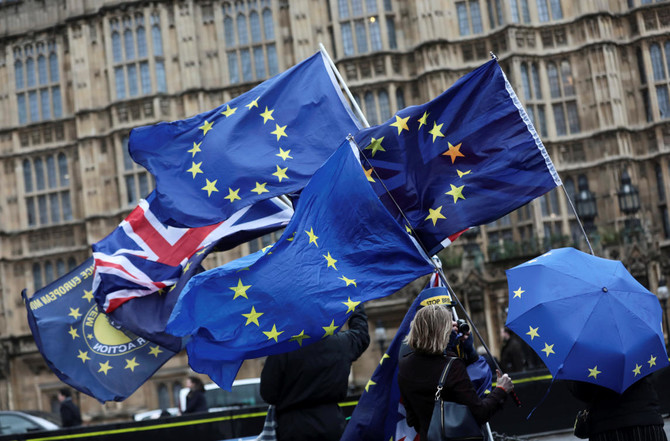
Polish students occupy top universities to cut ties with Israeli academia
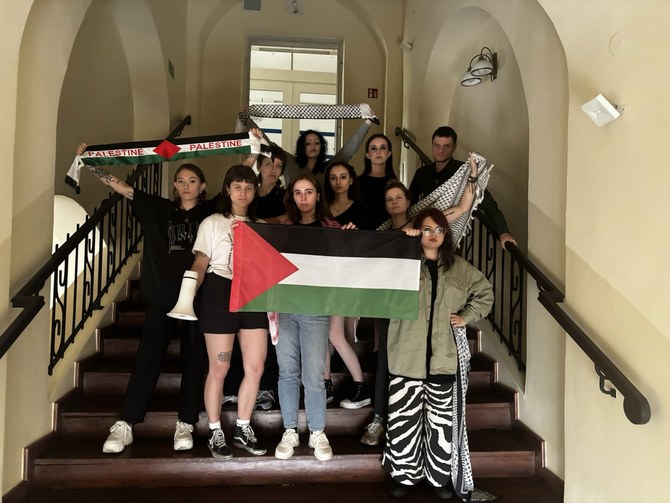
- Students set up encampments at the University of Warsaw and Jagiellonian University
- ‘We consider opposing genocide as our highest obligation,’ students say
WARSAW: Polish students have joined the global movement to end partnerships with Israeli institutions and were occupying the country’s top campuses on Saturday because of Israel’s war on Gaza.
Students and alumni of 12 universities in Poland have been calling on their management to publicly disclose which Israeli academia, research centers, organizations and companies they have been cooperating with and in what scope.
In open letters to rectors, they demanded that the universities “boycott Israeli institutions at the national and international level until the occupation of Palestine ends, recognize the right of Palestinians to equality and self-determination, and recognize the right of return for Palestinian refugees.”
As no action followed from university authorities, on Friday evening they set up encampments at the campuses of the University of Warsaw — the country’s largest academic institution — and of the Jagiellonian University — the oldest and most prestigious.
In a joint manifesto, the protesters said: “We will occupy the university space with our own bodies to demand action ... we consider opposing genocide as our highest obligation.”
Israeli airstrikes and ground offensives in Gaza have since October killed 36,000 Palestinians with more than 80,000 wounded, the vast majority children and women. Many have lost their lives as most of the hospitals have been flattened by bombardment and no medical assistance could reach them.
Protesting students say that failing to oppose the onslaught would mean tacit consent — and complicity.
The University of Warsaw is linked through a research project to the Ben-Gurion University, whose Homeland Security Institute partners with the biggest Israeli arms manufacturers such as Elbit Systems, Rafael Advanced Defense Systems and the Israeli Ministry of Defense. It is also linked to the University of Haifa, which runs special programs for Israeli forces and intelligence.
“As a student, I feel I should have a say in what our university is investing and what its partners are. We know that the university is tied to the Israeli army, forces and apartheid system,” Agnieszka, a sociology student and one of the coordinators of the strike at the University of Warsaw, told Arab News.
“That’s why I’m here ... I hope it will change something.”
Agnieszka was speaking from behind the university gate, which has been locked since Friday evening as campus authorities sealed all entry points, preventing anyone from leaving or getting inside.
People were coming to the gate and the campus fence to bring the students water, food and power banks, and to show support.
While no one could join their encampment anymore, the dozens of students gathered inside believed they could bring change.
“We’ve been protesting since October against the genocide that is occurring in Gaza, and now we’re sort of bringing it closer,” said Nena, who studies at the Faculty of Philosophy.
“We have more direct impact on the institutions we are part of.”
At the same time, 300 km away, students of the Jagiellonian University in Krakow were also locked up at their campus, posing the same demands as those in Warsaw, and vowing that they “will not be indifferent, will not be silent, will not be passive,” as they called for others to join.
“It’s important for me to be here,” Gabriela, an international relations student told Arab News from the Krakow protest site. “It’s important to show solidarity with other encampments around the world, so that authorities can’t ignore our demands any longer.”
The University of Warsaw and the Jagiellonian University have not engaged in any discussions with the protesters. Neither university commented on whether it would agree to the students’ demands. The spokesperson of the Jagiellonian University said that to “ensure the safety of the strike participants,” there was a person “appointed to monitor the situation.”
Millions of Indians beat extreme heat to cast votes
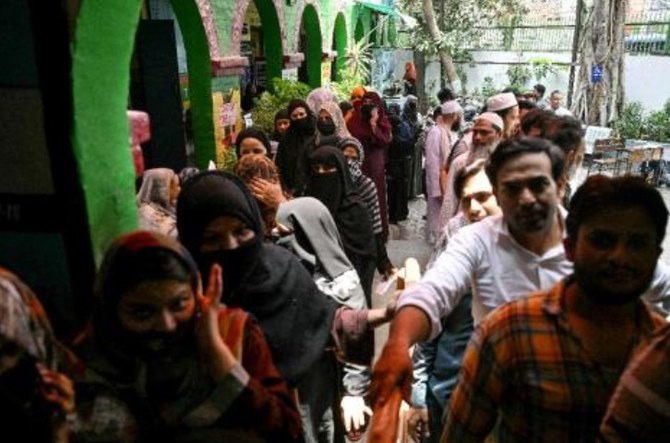
- 111 million people vote in election’s penultimate phase
- Temperature in New Delhi soared to more than 44 degrees Celsius
NEW DELHI: Voters in Delhi braved a sweltering heatwave on Saturday as they queued at polling stations in the penultimate phase of India’s general election.
The voting, which more than 968 million people have been eligible to do, started on April 19. Some of India’s 28 states and eight federally governed territories completed the process in a single day, while others have spread it out.
The sixth phase of the poll covered the capital, Delhi, as well as the neighboring states of Haryana and Uttar Pradesh, Jharkhand, Odisha, West Bengal and Bihar in the country’s east, and Jammu and Kashmir.
In Delhi, voters queued to cast their ballots despite the temperature soaring to over 44 degrees Celsius — with humidity making it feel like 56 C, according to reports — prompting the Election Commission to deploy paramedics to some polling stations.
While there have been concerns over voter turnout — with the first phase estimated to have seen at least 4 percent fewer people take part than in 2019’s election — those who arrived to cast their votes said there was no way the heat could deter them.
“Voting is the only way we can convey our feelings toward governance. It is a decisive way. To spend one hour in the line after five years is not a big deal for us,” said Karan Sharma, who was voting in the East Delhi constituency.
“We were complaining about the heat, but ... it’s a duty, it’s like eating food. After every five years, the festival comes, we have to participate in it.”
For Kavita Wadhwa, who cast her vote in the New Delhi constituency, it was a matter of exercising her rights.
“We have the right to select our own leaders,” she told Arab News. “It’s important for us ... It’s a democratic country.”
The election sees Prime Minister Narendra Modi chasing a third straight five-year term in power, targeting 400 of the 543 parliamentary seats for the National Democratic Alliance led by his Hindu nationalist Bharatiya Janata Party, which has been in power since 2014.
He is challenged by an alliance of two dozen opposition parties — the Indian National Developmental Inclusive Alliance (INDIA), led by the Congress Party, which ruled the country for close to 45 years following its independence in 1947.
Modi’s key contender is Congress leader Rahul Gandhi, the son of Rajiv Gandhi, a grandson of Indira Gandhi, and a great-grandson of Jawaharlal Nehru — all of whom were prime ministers of India.
Gandhi also cast his vote in Delhi on Saturday, after which he took to social media to encourage others to follow suit.
“Your vote will not only improve your life but will also protect democracy and the Constitution,” he said on X. “Come out of your homes in large numbers and vote for your rights and the future of your family.”
Around 111 million people were eligible to vote in the sixth phase of the election. Some of them, like Arohi Anand, were voting for the first time.
“I think it’s a great right ... The government is for us — if we don’t vote, it is on us,” he told Arab News. “(The heat) is a secondary thing. The most important thing is our vote, because the government is the most important thing; it will shape our future.”
The party or coalition that wins at least 272 of the 543 contested seats in the lower house of parliament will form the government.
The first five phases of the election have already decided the fate of 429 representatives. Saturday’s vote will add another 58.
The seventh and final phase of the election will be held on June 1. Vote counting will take place on June 4.
Russian strike on Kharkiv hardware store kills two: official
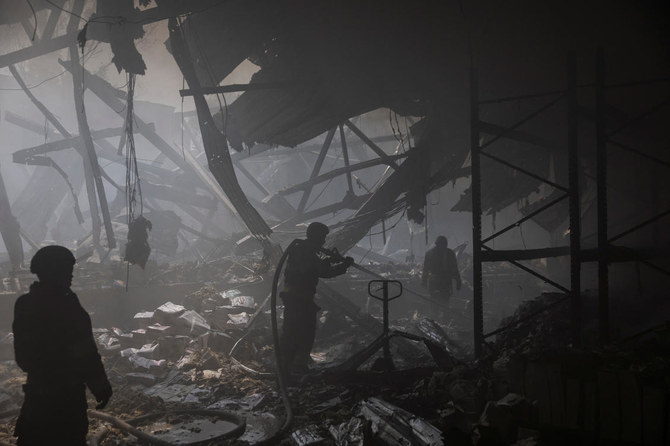
- Kharkiv regional governor Oleg Synegubov said that “two Russian guided bombs hit a construction hypermarket“
- Videos posted by witnesses on social media showed a huge column of black smoke billowing into the sky from the Epitsentr store
KYIV: A Russian strike on Saturday hit a store selling building materials in the eastern Ukrainian city of Kharkiv, killing at least two people, its mayor said.
“We know for sure about two dead,” Kharkiv mayor Igor Terekhov wrote on Telegram, saying that according to preliminary information the strike hit a hypermarket for construction materials in a residential area.
Kharkiv regional governor Oleg Synegubov said that “two Russian guided bombs hit a construction hypermarket” and “a fire broke out over 15,000 square meters.”
Videos posted by witnesses on social media showed a huge column of black smoke billowing into the sky from the Epitsentr store, located in an area of large stores beside a car park. The chain of hypermarkets sells household and DIY goods.
“We have a large number of people missing. There are many wounded,” Terekhov wrote on Telegram.
“Apparently, the attack was on a shopping center where there were many people — this is pure terrorism.”
The city of Kharkiv, Ukraine’s second largest, regularly comes under attack from Russian missiles.
Strikes on the city killed at least seven people on Thursday, local authorities said.
Russia launched a ground offensive in the northeastern Kharkiv region on May 10, but Ukraine said Friday that it had managed to halt its progress.
British man charged after allegedly joining Syrian terror group
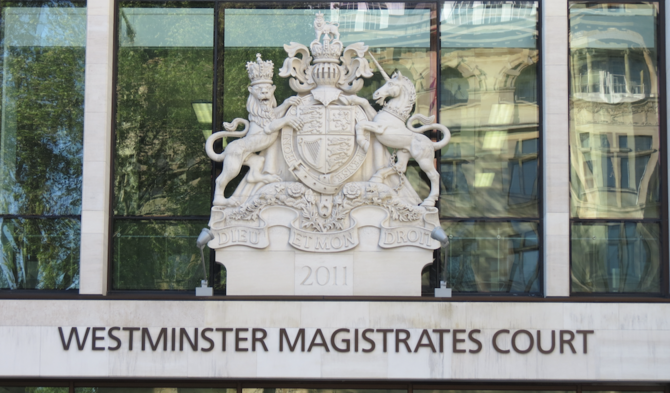
LONDON: A British man who allegedly travelled to Syria to fight for the Jaish Al-Fatah group has been charged with terrorism offences, the Metropolitan Police said on Saturday.
Isa Giga was arrested after arriving in London aboard a flight from Turkey on Thursday.
He was due to appear at Westminster Magistrates’ Court on Saturday. He is suspected of traveling to commit acts of terrorism.
“We have been clear for some time now that should anyone return to the UK whom we suspect of being involved in any terrorist-related activity overseas, then they can expect to be thoroughly investigated,” Commander Dominic Murphy, head of the force’s Counter Terrorism Command told the BBC.
“We work very closely with other partners and agencies here in the UK and overseas in order to do this and help keep the public safe.”
A mob in Pakistan burns down a house and beats a Christian over alleged desecration of Qur’an
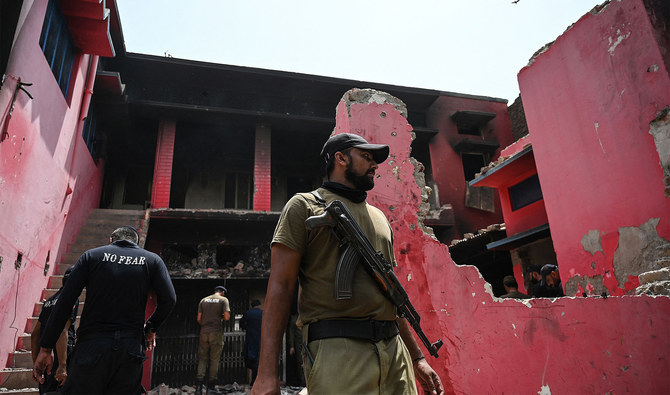
- The incident occurred Saturday in the Mujahid Colony residential area in Sargodha
- Police quickly responded and saved the lives of the two men
LAHORE: Hundreds of Muslims in eastern Pakistan went on a rampage over allegations that a Christian man had desecrated the pages of Islam’s holy book, ransacking and burning his house and beating him before police officers rescued the man and his father, officials said.
The incident occurred Saturday in the Mujahid Colony residential area in Sargodha, a city in Punjab province, said district police chief Ijaz Malhi. He said police quickly responded and saved the lives of the two men.
Malhi said the situation was under control and officers were investigating the allegations.
The incident brought back memories of one of the worst attacks on Christians in Pakistan in August 2023, when angry mobs burned churches and attacked dozens in Jaranwala, a district in Punjab province. Muslim residents claimed they saw a Christian and his friend tearing out pages from a Qur’an and throwing them on the ground. No one was killed. In 2009, six Christians were killed and some 60 homes burned down in the district of Gojra in Punjab following allegations of insults to Islam.
Malhi said police on Saturday dispersed the crowds and were also seeking help from religious scholars to defuse tensions. The Punjab government condemned the attack.
The man’s small shoemaking factory was also burned down, Malhi said.
Blasphemy accusations are common in Pakistan.
Under the country’s blasphemy laws, anyone found guilty of insulting Islam or Islamic religious figures can be sentenced to death. While no one has been executed for blasphemy, often just an accusation can cause riots and incite mobs to violence, lynching and killings.


